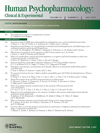Carryover effect on next-day sleepiness and psychomotor performance of nighttime administered antihistaminic drugs: a randomized controlled trial
Abstract
Background
Antihistamines with strong sedative–hypnotic properties are frequently prescribed for insomnia secondary to allergy, but the potential risks of such administration have not been fully elucidated.
Subjects and methods
This randomized, double-blind, placebo-controlled crossover study was conducted to evaluate next-day sleepiness and psychomotor performance following the administration of antihistamines. Twenty-two healthy male participants participated in four drug administration sessions with more than a 1-week interval between the sessions. Either zolpidem 10 mg, or diphenhydramine 50 mg, or ketotifen 1 mg, or a placebo was administered before sleep, and polysomnography was conducted to evaluate sleep. In the morning and afternoon of the day after administration, the participants were evaluated for subjective sleepiness, objective sleepiness, and psychomotor performance.
Results
The antihistamines with high blood–brain barrier-crossing efficiency were significantly associated with sleepiness and psychomotor performance decline the next day. Ketotifen showed the strongest carryover effect, followed by diphenhydramine. Compared with the placebo, no significant carryover effect was observed with zolpidem.
Conclusion
The results suggest that the risk–benefit balance should be considered in the ready use of antihistamines that easily cross the blood–brain barrier for alleviating secondary insomnia associated with allergies. Copyright © 2012 John Wiley & Sons, Ltd.




